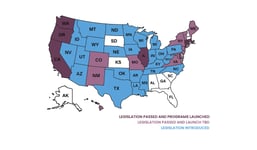Are Small Businesses Required to Offer Retirement Plans?

When it comes to choosing an employer, the first thing many of today’s job seekers consider is what retirement benefits are offered. To gain the attention of the best candidates and reduce churn, it’s therefore important to present the very best small business 401(k) retirement options to all.
But is it a legal requirement to do so? What legal changes have been made recently on the topic? Read on to find out.
Changes to federal and state requirements for retirement plans for small businesses
The United States is on the brink of a retirement savings crisis and has been for the past several years. Individual states are looking to small business owners for help to eliminate what many fear will be a severe drain on state social services once their employees reach retirement age. If the right plans are not put into place, many experts fear it will have a negative impact on the economy.
Most U.S. workers don’t have enough in savings for their retirement years. As a result, several bills were introduced in 2022 to remedy this issue but were later put to a halt thanks to the approval of The SECURE 2.0 Act of 2022.
The SECURE 2.0 Act of 2022
A large federal spending bill totaling $1.7 trillion was endorsed as a law in December by President Biden. It includes several considerable modifications to the retirement system in America.
Here are a few key highlights of the recent bill.
- The majority of business owners must now automatically enroll their workers in their company’s retirement plan at a minimum rate of 3% (the maximum is 10%). Following the initial year, the automatic enrollment rate increases by 1% per year until it reaches at least 10% (and a maximum of 15%). The changes will be effective for retirement plan years starting after December 31st, 2024. (Workers can opt out if they choose.)
- There will be an increase in the age for required minimum distributors (RMDs). It will go up from age 72 to 73 in 2023; by 2033, it will have gone up to 75.
- All plan sponsors who have part-time staff that work between 500 to 999 hours each year – and have been working with the company for two years – must allow those staff to take part in the plan.
- Currently, the waiting period is three years. These changes are expected to go into effect for all plan years beginning after December 31, 2024.
- All company owners can add a provision to their plan document to make a matching contribution on behalf of their workers who are repaying their student loans, instead of matching their retirement contributions.
What plan options for 401(k) retirement savings are currently available to small business owners?
Small business owners who want to offer a 401(k) plan have multiple options to choose from.
Simple 401(k)s
Along with a traditional 401(k) plan, today’s employees may be offered plans such as the SIMPLE (Savings Incentive Match Plan for Employees) 401(k) plan for small businesses with 100 or fewer workers.
Safe Harbor 401(k)s
Safe harbor 401(k) plans allow employers to avoid nondiscrimination tests that are necessary with other traditional 401(k) plans. Nondiscrimination tests are designed to make sure the retirement plans do not favor highly compensated workers over other workers who are paid less. These plans are ideal for small business owners because they can be much easier to manage.
Solo 401(k)s
Company owners who do not have any employees can still contribute to a 401(k) plan for themselves using a one-participant or a solo 401(k) plan. The eligibility for this type of plan is limited to the owner and their spouse (if their spouse works for the same business and receives pay from it).
SEP IRAs
A Simplified Employee Pension (SEP) plan is an employer-sponsored arrangement for businesses that have more than one employee, and their employer contributions are made to IRAs (individual retirement account), established for each employee who is eligible. Many small businesses choose SEP IRAs since they are affordable and simple to manage.
Pooled Employer Plans (PEP)
Recently, PEPs have become more popular among small business owners. They make it possible for more than one small business owner to come together and jointly offer a reasonable and reliable 401(k) retirement plan to their workers.
Are small businesses legally obligated to offer 401(k)s?
Although many employers offer a 401(k) plan to their workers these days, they are not required by law to do so. According to information from the U.S. Bureau of Labor Statistics, just 67% of private industry workers had access to a 401(k) plan in 2020.
Requirements for business owners regarding retirement plans are ever-changing, but at this time, employers do not have a legal obligation to offer a 401(k) plan to their workers. Still, some states have introduced laws that require all business owners to either offer a plan to their eligible employees or participate in a state-sponsored plan, which is typically in the form of a Roth IRA.
Frequently asked questions about small businesses and retirement plans
Are some businesses too small for a 401(k) investment plan?
Most businesses are working on boosting their retirement benefits in an effort to attract more employees. However, there are still many small businesses that do not offer any plans.
Many small business owners assume that the cost of offering a 401(k) plan would not be worthwhile considering their small number of staff. But fortunately, they have the option to choose from a range of new retirement plan options available under the federal tax code.
The right plan will depend on a few factors including the size of the company, how much the business owner contributes to the plan each year, and the employee's compensation. It also depends how much administrative work one is prepared to take on, as well as any tax benefits that may be involved.
Are small business owners required to make matching employer contributions to their 401(k) plan?
The idea of employee matches for 401(k)s is optional with all traditional plans. However, when it comes to a SIMPLE 401(k) plan, the business owner must either make matching employer contributions or nonelective employee contributions for workers that don’t make their own contributions.
Similar rules may apply to other plans such as the Safe Harbor 401(k) plans, as well as those that have an automatic enrollment feature. Therefore, it's essential to find out beforehand what type of options are available for individuals willing to offer employer or employee contributions.
Do employees of a small business have to participate a 401(k) retirement plan?
No, employees are not required to take part in their company’s 401(k) plans. However, some plans will automatically enroll employees each year unless they decide to opt-out, which the employee has the right to do.
In closing
Business owners offer 401(k) retirement plans to attract and retain talent. At this time, there is no legal obligation for them to do so which is why many small businesses choose not to offer these plans.
However, legal requirements could change in the months and years to come. We’re already seeing some important changes – for example, the SECURE 2.0 ACT of 2022 will soon require many employers to automatically enroll their workers in their company’s retirement plan.
If a small business owner decides to offer a 401(k) plan, there are several options for them to choose from that can be both affordable and rewarding. Plans that are ideal for those who want to include employee contributions as well as those who do not include SIMPLE 401(k)s, Safe Harbor 401(k)s, and Pooled Employer Plans.
With the right plan and partner, businesses can benefit from improved employee engagement and loyalty while helping them build their retirement savings. Get started today with a free, no-obligation consultation with a 401(k) retirement specialist.




